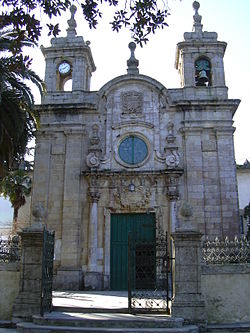Mondoñedo
| Mondoñedo | |||
|---|---|---|---|
| Municipality | |||

Entrance to the Sanctuary of Remedios
|
|||
|
|||
| Location in Spain | |||
| Coordinates: 43°25′41″N 7°21′46″W / 43.42806°N 7.36278°W | |||
| Country | Spain | ||
| Autonomous community | Galicia | ||
| Province | Lugo | ||
| Comarca | Mariña Central | ||
| Government | |||
| • Mayor | Orlando González Cruz | ||
| Area | |||
| • Total | 142.66 km2 (55.08 sq mi) | ||
| Elevation | 141 m (463 ft) | ||
| Population (2009) | |||
| • Total | 4,508 | ||
| • Density | 32/km2 (82/sq mi) | ||
| Demonym(s) | Mindonienses | ||
| Time zone | CET (UTC+1) | ||
| • Summer (DST) | CEST (UTC+2) | ||
| Postal code | 27740 | ||
Mondoñedo (Galician pronunciation: [mondoˈɲeðo]) is a small town and municipality in the Galician province of Lugo, Spain. As of 2009[update], the town has a population of 4,508. Mondoñedo occupies a sheltered valley among the northern outliers of the Cantabrian Mountains. Despite being the core of the region of La Mariña, it is the city with the third biggest population after Foz and Burela.
The municipality of Mondoñedo is in the northern half of the province of Lugo and is bordered on the north by the municipalities of Foz and Alfoz, to the south by Pastoriza and Riotorto, to the east by Lorenzana and to west with Abadín.
The population of Mondoñedo is distributed throughout the 15 parishes that make up the council.
After having been for nearly a century and a half in the hands of the Moors, Mondoñedo was recaptured by Ordoño I of Asturias in 858; and the Christian possession was made permanent by Alfonso III of León in 870. It was taken by surprise by the French in 1809 during the Napoleonic Wars.
The Galician Province of Mondoñedo disappeared in 1833 when all the seven provinces of Galicia were reduced to four, and the entire Province of Mondoñedo was first divided into two halves and later absorbed and assimilated into the existing provinces of Lugo and A Coruña.
The town was declared a national cultural-historical site in 1985. Its main attraction is the Cathedral, begun in Romanesque style around 1230. It reflects an unusual mixture of styles: Gothic in the nave and the aisles, and Baroque in the its 18th-century towers. The polychrome statue in the high altar, called Nuestra Señora la Inglesa (the English Madonna) was rescued from St Paul's Cathedral in London during the Protestant Reformation of Henry VIII of England.
...
Wikipedia



